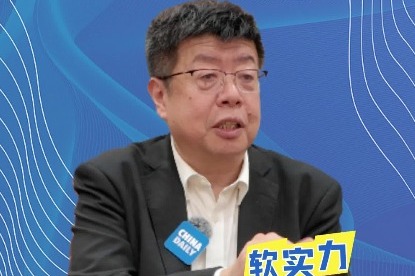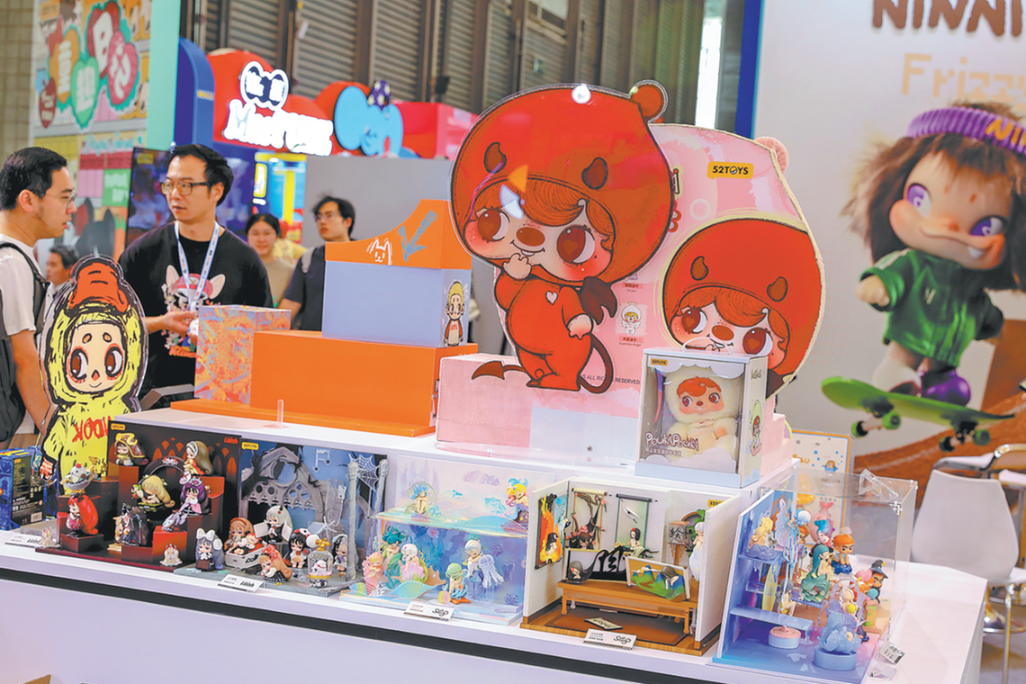FROM RICKETY BIKES TO AUTOMATED STROLLERS, MODERNIZATION TRANSFORMS COUNTY
Pingxiang builds on humble origins to become global leader in bicycles, child vehicles

Editor's note: In a series of reports titled "Claims to Fame", China Daily looks at how some regions have earned wealth and recognition through specific products to advance economic development.
As morning mist lingers over a residential compound, a mother places her toddler in a stroller.
After activating an auto-follow mode, the "Xiaokabu" automated smart stroller glides silently behind her like a loyal nanny, gently avoiding pebble paths and puppies.
When she crouches to wipe her child's face, the stroller halts. As she resumes walking, it follows without delay.
"It drives itself! So convenient!" an elderly person exercising nearby exclaims.
Initially skeptical about its safety, the mother had worried the stroller might wander off track. But she has been delighted to learn that it functions seamlessly and safely.
This futuristic scenario happened recently in Pingxiang county of Xingtai, a city in Hebei province — a hinterland area that produces a huge proportion of the world's strollers.
Yet the birthplace of this cutting-edge baby carrier traces its roots back to humbler beginnings.
Birth of the Black Tiger
In the 1970s, Pingxiang was a small county where a bicycle was more than just a vehicle — it was a symbol of prosperity and a coveted item in the "three essentials" for marriage. The other two were a sewing machine and a wristwatch.
However, for ordinary people, especially those in rural areas, acquiring a bicycle was no easy task due to its high price and the scarce supply.
"They were like the Ferraris of today," recalled Chai Cunliang, 66, president of Pingxiang County Toy and Baby Products Trade Association.
However, necessity is the mother of invention.
Two resourceful locals, Pan Baose and Pan Baochun, took matters into their own hands when one of the men's sons needed a bicycle to fulfill his marriage obligations.
They gathered parts from various sources, including substandard components from relatives working at bicycle factories in neighboring Tianjin city.
In a dusty shed, they assembled the county's first no-name bicycle — a two-wheeler with a rickety frame locals dubbed heilaohu or Black Tiger.
Word spread like wildfire about the pair's initiative.
"This initial endeavor gradually spread, and bicycle parts trading markets began to emerge," Chai said. These markets gradually helped Pingxiang grow into a significant bicycle parts trading hub.
"The seed of the county's bicycle and child vehicle industry was planted," said Chai, who has witnessed the industry's remarkable development over the past five decades.
"The stories of the Black Tiger and the growth of the bicycle parts trading market highlight the entrepreneurial spirit of Pingxiang's people and mark the beginning of a major global child vehicle hub," he said.
From its humble beginnings, the county gradually developed into a bicycle and child vehicle industry cluster that now produces bicycles, child vehicles and toy vehicles, as well as their parts.
World exposure
According to Chai, there's a saying in the industry that, "The world looks to China for baby strollers, while China looks to Pingxiang for them."
Pingxiang county now stands as a powerhouse in the bicycle and child vehicle industry, boasting over 8,000 upstream and downstream enterprises, according to the local government.
It produces about 50 percent of the nation's and 40 percent of the world's bicycles and child vehicles, with products exported to over 100 countries and regions, statistics show.
In recent years, a growing number of foreign merchants have traveled to the county to inspect and purchase bicycles, strollers and components.
Ilhomjon Turdikulov, a buyer from Uzbekistan, visited Pingxiang on June 10 to purchase bicycle parts, and stayed in the county for about a week.
"The parts I bought last time have sold out, so I came for some new ones," he said, adding that the components he purchased in Pingxiang are very popular in his country. His previous journey was in March.
Turdikulov is an old friend of Qin Shaopeng, sales manager of Xingtai Yakexi Bicycle Co in Pingxiang, which produces bicycles and strollers, and parts for bikes, strollers and tricycles. He speaks Russian fluently with Turdikulov.
"All of our products are made for export to Central Asian countries, which have strong demand for the bicycles and their parts," Qin said.
"We have known each other for four or five years, and he (Turdikulov) always comes to us at least twice a year," Qin said. "Years ago, foreign purchasers only bought 100 bike parts or so each time they visited. Today, it's at least 300 or 400," he said proudly, adding that customers like Turdikulov are satisfied with the quality of Pingxiang-made products.
"Every time I come, I find new products. This time, I have already ordered three truckloads of goods," Turdikulov said.
Customers like Turdikulov learn about the county through trade shows or are introduced to its products by friends and colleagues. E-commerce platforms are also helping local businesses go global.
The county has hosted 19 consecutive expos to showcase its bicycles, child vehicles, and toys. The latest exhibition in March attracted more than 1,500 companies from inside and outside the province and customers from around the globe, with 4.15 billion yuan in orders made, according to local government data.
"While people around the world come to Pingxiang, the industry has evolved from small assembly operations into a sophisticated cluster with a complete industrial chain, covering everything from raw materials like steel, plastic, and rubber to parts manufacturing, whole-vehicle assembly, research and development, and modern logistics," Chai said.
It is a key pillar of the local economy, employing 120,000 people and generating revenue of over 30 billion yuan in 2024, according to Li Yunping, an official with the county's market supervision and administration bureau.
Innovation drive
The bicycle and child vehicle industry in Pingxiang has undergone remarkable modernization in recent years. "The county has strengthened its technological innovation drive, and accelerated the upgrading of industrial clusters," according to Chai.
At Hebei Kexin Electronic Technology Co, an engineer demonstrates an AI-controlled child's car — a miniature version of a cross-country vehicle.
At the verbal instruction "Xiao Wei, turn on the car lights", the vehicle, named Xiao Wei, turns on its lights right away.
When the vehicle is told "Xiao Wei, please read aloud the poem Jing Ye Si (Quiet Night Thought)", the vehicle obliges. "All right, please listen carefully," the vehicle replies and starts reading the famous poem.
Jin Yu, the company's general manager, said the vehicle's intelligence is due to the installation of a "smart brain" AI controller. Its chip can handle voice commands, issue collision alerts, and has GPS tracking, just like a real smart car.
"With the AI controller, this electric toy car has achieved various functions such as human-machine interaction, automatic obstacle avoidance, Bluetooth connectivity, and online information exchange," Jin said.
"Although the technology has become relatively common, its application to toy cars is not yet very widespread," he added.
Nearby, another company Hebei Fubei Bicycles Co is creating an industrial ecosystem where research and development is seamlessly integrated with production.
The company's vehicle sales manager, Xin Lei, said thanks to Kexin's AI controller they were able to launch electric child cars with collision prevention features, and quickly seize the market opportunity.
Digitalization is playing an important role in the transformation of the child car industry.
The county has established an industrial development fund to target key aspects of digital transformation of equipment and production lines, according to the local government.
A smart connected platform has been established for the bicycle and child car industry to accelerate deep integration of digital technology with the real economy.
So far, 20 companies have embarked on the journey of "smart transformation and digital conversion", with 61 companies completing digital transformations, according to a report by Hebei Daily. "This has significantly enhanced the industry's competitiveness," Chai said.
As a result, the industry in Pingxiang has gradually shifted from a focus on low-cost assembly toward technological innovation and high-quality development.
This transformation is exemplified by the story of Wang Zhanying and his company — Xingtai Hengpeng Bicycle Industry Co.
The latest Xiaokabu AI interactive baby stroller developed by the company is about to be launched on the market in a few months.
This stroller not only features functions like voice and gesture control, but also includes capabilities such as automatic following, obstacle avoidance navigation, precise positioning, and anti-loss functions.
"When a child is sitting in the baby stroller, adults don't need to push it by hand. The stroller will automatically follow the footsteps of the adult. Even when encountering slopes or obstacles, it will navigate around them automatically," Wang said.
According to Wang, his factory used to be an original equipment manufacturer, with a low profit margin of less than 8 percent.
However, with the support of the Pingxiang County Bicycle Industry Research Institute, the company underwent a major transformation.
"The research institute has helped my company overcome the lightweight dilemma (of the stroller) and the issue of single-function products by introducing optimized structures," Wang said, adding that the curvature of the stroller's seat cushion has been designed to mimic the shoulder and neck curve of a sleeping baby.
Structural analysis conducted by 3D "stress software" resulted in a design where the entire vehicle can be folded up to resemble an elegant travel bag when not in use.
By constructing innovative support structures in key parts of the frame and removing 60 percent of non-load-bearing materials, the company successfully reduced the weight of the stroller from 12 kilograms to 6 kg, achieving a 50 percent weight reduction.
"These technological innovations enabled the company to gain a significant competitive edge in the market," Wang said.
R&D boost
Despite its remarkable achievements, the bicycle and child vehicle industry in Pingxiang faces challenges such as the need for greater innovation and brand building, as well as the push for higher-end products.
"Although we have a very solid foundation for development at present, there are still some issues. For example, our comprehensive research and development design is still relatively weak, and there are few well-known companies or brands," Chai said.
To address these challenges, local enterprises are increasing their investment in research and development, adopting advanced technologies and equipment, and strengthening cooperation with various institutions, according to Chai.
"This is aimed at improving product quality, developing more high value-added products, and enhancing the industry's competitiveness," he said, adding that the local government will continue to provide strong support, creating a favorable environment for the industry's development.
Industry associations and enterprises will also work together to promote the transition from "manufacturing" to "quality manufacturing" and from "products" to "brands", realizing the vision of cementing Pingxiang as a global leader in the bicycle and child vehicle industry.
"As this industry continues to evolve, it will bring more high-quality products to consumers worldwide," Chai said.





Today's Top News
- China's grain output hits new high in 2025
- Trump drops EU tariff threat after deal framework over Greenland in Davos
- China's message in Davos draws praise
- Consensus, not coercion, key to Ukraine crisis
- Wide view seen as key to full grasp of China
- Trump seeks immediate talks on buying Greenland






























